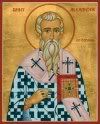...whenever the teaching of faith deviates even a little from its basic purity, the deviation, growing little by little, cannot help becoming a contradiction to faith. The lack of wholeness and inner unity of faith compels one to seek unity in abstract thinking; and reason, having received equal rights with Divine Revelation, first serves as the ground of religion, and subsequently replaces it.
Ivan Kireevskii
Showing posts with label Ivan Kireevskii. Show all posts
Showing posts with label Ivan Kireevskii. Show all posts
Wednesday, December 06, 2006
The purity of faith
Tuesday, November 14, 2006
The end of reason
Western man, having through the exclusive development of his abstract reason lost faith in all convictions not derived from it, has now owing to that same development, lost his last faith-faith in the omnipotence of that reason.
Ivan Kireevskii
Labels:
Ivan Kireevskii,
man,
reason
Saturday, August 05, 2006
The law of the human mind
Standing on this highest level of [noetic] thought, the Orthodox believer can easily and harmlessly comprehend all systems of thought deriving from the lower levels of reason; he can see their limitations and their relative truthfulness. However, for the lower form of thought, the higher is incomprehensible and appears nonsensical. Such, in general, is the law of the human mind.
Ivan Kireevsky
Monday, July 24, 2006
The contradiction of deviation
… whenever the teaching of faith deviates even a little from its basic purity, the deviation, growing little by little, cannot help becoming a contradiction to faith. The lack of wholeness and inner unity of faith compels one to seek unity in abstract thinking; and reason, having received equal rights with Divine Revelation, first serves as the ground of religion, and subsequently replaces it.
Ivan Kireevskii
Wednesday, June 14, 2006
The corners of the (Western) heart
Western people fragment their lives into separate aspirations; and though they then unite them into a coherent plan by means of rationalistic understanding, at each moment of life the individual is like a different person. One corner of the heart shelters the Western person’s religious feeling, which is called upon on occasions of ritual observance; another, quite separate, harbors the faculties of reason and the capacity for worldly activity; a third corner contains the person’s sensual desires; a fourth, a sense of morality and family; a fifth, self-interest; a sixth, the desire for aesthetic pleasure. And each of these separate strivings is subdivided into further aspects, each accompanied by a special state of mind, each manifesting itself separately from the others, all bound together only by an abstract, rationalistic recollection. Westen people can easily pray in the morning with fervent, intense, amazing zeal and then rest from that zeal, forgetting prayer and exercising other faculties in their wok. They then rest from their work, not just physically but morally, forgetting its dull routine in laughter and the sound of drinking songs, They then forget the rest of the day—indeed, their whole life—in dreamy enjoyment of an artificial spectacle. Next day it will be easy for them to begin again turning the wheel of their outwardly correct lives.
Ivan Kireevskii
Friday, April 14, 2006
The opposite of an error
…they created a new theological dogma of the Godhead [the Filioque] in direct opposition to the Arians under the influence of this same superficial logical thought — a dogma they regarded as true only because it was the direct opposite of one form of heresy, forgetting that the direct opposite of an error is generally not the truth, but only the other extreme of the same error.
Ivan Kireevsky
Monday, April 03, 2006
Nothing further
The philosophical orientation towards autonomous rational thought which began in the West about the time of the Protestant Revolution, and whose first representatives in philosophy were Bacon and Descartes, has steadily grown and spread in the course of three and one-half centuries, sometimes proliferating into numerous separate systems, sometimes combining to produce their great summations, thus passing through all the stages of possible progress, and has finally attained the last, all-inclusive conclusion beyond which European man’s mind cannot aspire without completely changing its basic orientation. For when man rejects every authority except his abstract thinking, can he advance beyond the view which presents the whole existence of the world as the transparent dialectic of human reason, and human reason as the self-consciousness of universal being? Obviously, in this case, the ultimate goal which can be conceived by abstract reasoning separated from other cognitive faculties, is the goal he has been approaching for centuries, has now attained, and beyond which is nothing further to seek.
Ivan Kireevsky (1856)
Friday, March 24, 2006
That Divine truth would permeate
…consciousness of the Divine is equally compatible with all stages of rational development. But, in order that Divine truth might permeate, enliven, and guide man’s intellectual life, it must subordinate external reason to itself and dominate it, not remain outside its sphere of action. Divine truth must stand above other truths in the general consciousness as the sovereign principle pervading all culture.
Ivan Kireevsky
Saturday, March 18, 2006
The struggle of philosophy
Although engaged in a life-and-death struggle with the falsehood of pagan mythology, Christianity did not destroy pagan philosophy; rather it took it and transformed it in accordance with its own superior knowledge. The brightest lights of the Church — Justin, Clement, Origen (insofar as he was Orthodox), Athanasius, Basil, Gregory, and most of the great Holy Fathers upon whose work, so to speak, Christian teaching became established in the midst of a pagan culture — not only were thoroughly versed in ancient philosophy, but utilised it for the rational construction of the first Christian gnosiology, which combined the development of science and reason into an all-embracing vision of faith.
Ivan Kireevsky
Subscribe to:
Posts (Atom)

